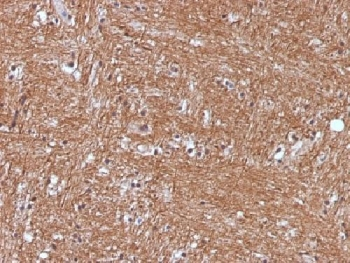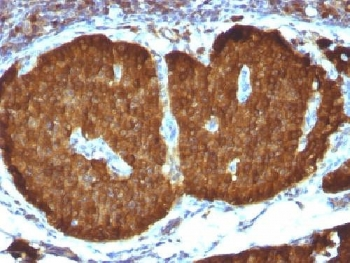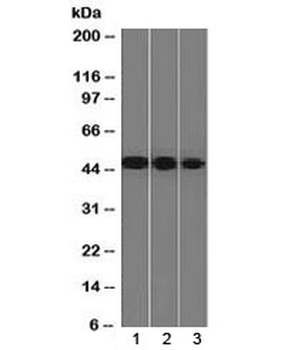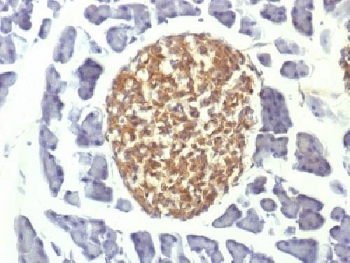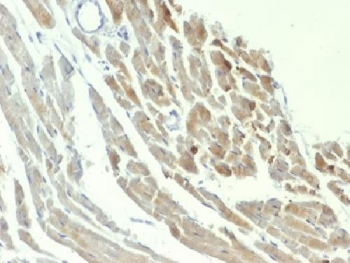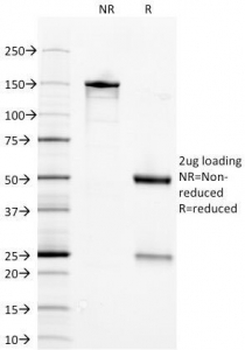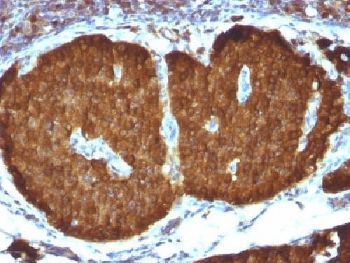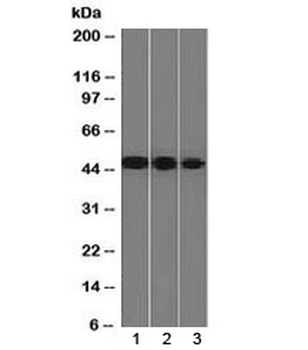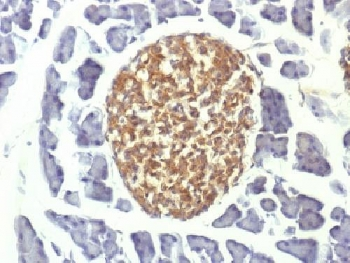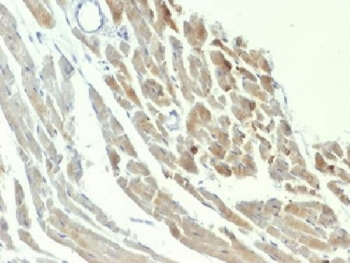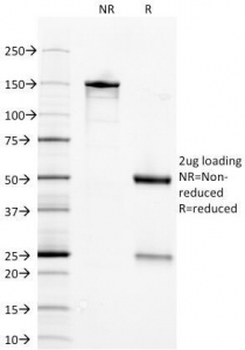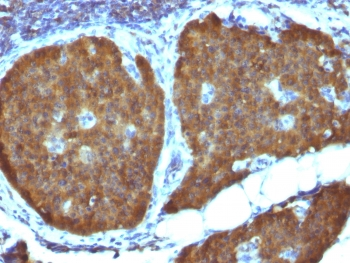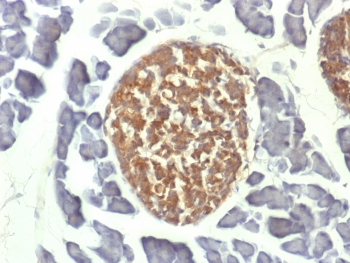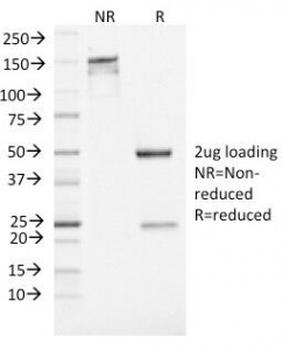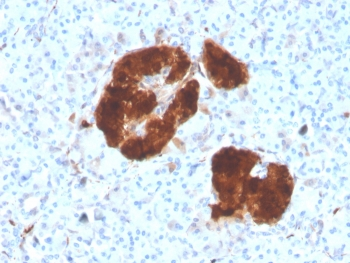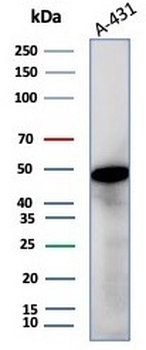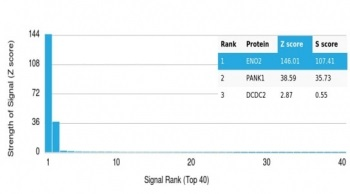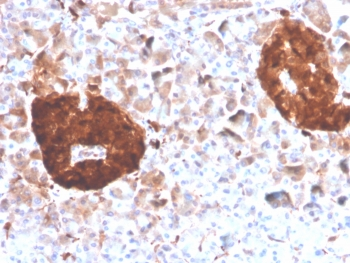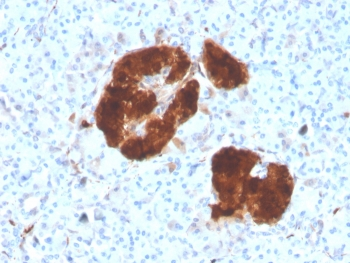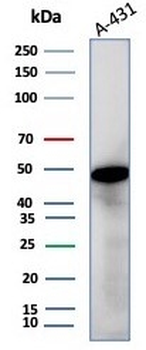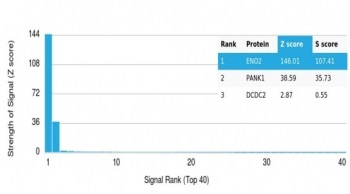You have no items in your shopping cart.
NSE Antibody / Neuron Specific Enolase
Catalog Number: orb750096
| Catalog Number | orb750096 |
|---|---|
| Category | Antibodies |
| Description | This mAb recognizes a protein of about 50 kDa which is identified as gamma-Enolase/Neuron Specific Enolase/Enolase 2. Three isoenzymes of enolases are identified, alpha, beta and gamma. Alpha-isoform is expressed in most tissues, whereas beta-form is expressed predominantly in muscle tissue and gamma-enolase is found only in nervous tissue. These isoforms exist as both homodimers and heterodimers, and they play a role in converting phosphoglyceric acid to phosphenolpyruvic acid in the glycolytic pathway. NSE is a useful marker to identify peripheral nerves and tumors of neuro-endocrine origins, such as pheochromocytomas. It it be usually employed in combination with other markers such as Synaptophysin, Chromogranin A, and Neurofilament. |
| Species/Host | Mouse |
| Clonality | Monoclonal |
| Clone Number | ENO2/1462 |
| Tested applications | IHC-P |
| Reactivity | Human, Mouse, Rat |
| Isotype | Mouse IgG2b, kappa |
| Immunogen | Amino acids 416-433 of human NSE were used as the immunogen for this Neuron Specific Enolase antibody. |
| Antibody Type | Primary Antibody |
| Dilution range | Immunohistochemistry (FFPE): 0.1-0.2ug/ml for 30 min at RT |
| Purity | Protein G affinity chromatography |
| Conjugation | Unconjugated |
| Formula | 0.2 mg/ml in 1X PBS with 0.1 mg/ml BSA (US sourced) and 0.05% sodium azide |
| Hazard Information | This Neuron Specific Enolase antibody is available for research use only. |
| UniProt ID | P09104 |
| Storage | Store the Neuron Specific Enolase antibody at 2-8°C (with azide) or aliquot and store at -20°C or colder (without azide). |
| Buffer/Preservatives | 0.2 mg/ml in 1X PBS with 0.1 mg/ml rAlbumin (US sourced) and 0.05% sodium azide |
| Note | For research use only |
| Application notes | The concentration stated for each application is a general starting point. Variations in protocols, secondaries and substrates may require the Neuron Specific Enolase antibody to be titered up or down for optimal performance.1. The prediluted format is supplied in a dropper bottle and is optimized for use in IHC. After epitope retrieval step (if required), drip mAb solution onto the tissue section and incubate at RT for 30 min. |
| Expiration Date | 12 months from date of receipt. |
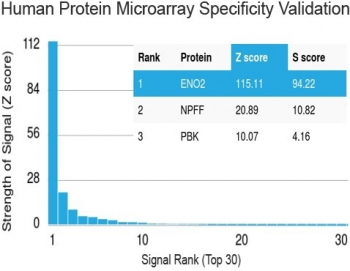
Protein array validation of the Neuron Specific Enolase antibody: Analysis of HuProt (TM) microarray containing more than 19, 000 full-length human proteins using Neuron Specific Enolase antibody (clone ENO2/1462). These results demonstrate the foremost specificity of the ENO2/1462 mAb. Z- and S- score: The Z-score represents the strength of a signal that an antibody (in combination with a fluorescently-tagged anti-IgG secondary Ab) produces when binding to a particular protein on the HuProt (TM) array. Z-scores are described in units of standard deviations (SD's) above the mean value of all signals generated on that array. If the targets on the HuProt (TM) are arranged in descending order of the Z-score, the S-score is the difference (also in units of SD's) between the Z-scores. The S-score therefore represents the relative target specificity of an Ab to its intended target.
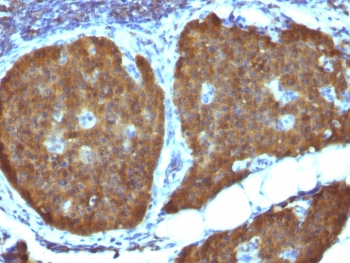
IHC testing of FFPE human pheochromocytoma with Neuron Specific Enolase antibody (clone ENO2/1462). Required HIER: boil sections in 10mM citrate buffer, pH6, for 10-20 min.
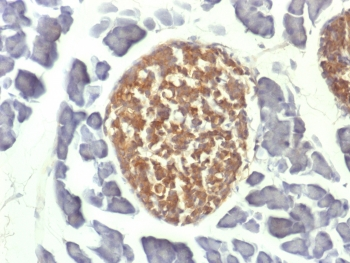
IHC testing of FFPE mouse pancreas with Neuron Specific Enolase antibody (clone ENO2/1462). Required HIER: boil sections in 10mM citrate buffer, pH6, for 10-20 min.
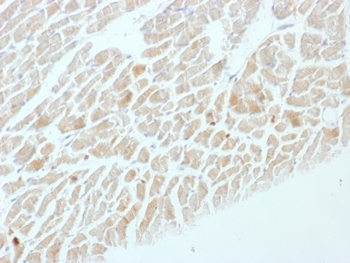
IHC testing of FFPE rat heart with Neuron Specific Enolase antibody (clone ENO2/1462). Required HIER: boil sections in 10mM citrate buffer, pH6, for 10-20 min.
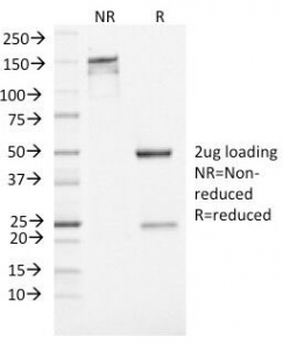
SDS-PAGE Analysis of Purified, BSA-Free Neuron Specific Enolase Antibody (clone ENO2/1462). Confirmation of Integrity and Purity of the Antibody.
NSE Antibody / Neuron Specific Enolase [orb386134]
IHC-P, WB
Human, Mouse, Rat
Mouse
Monoclonal
Unconjugated
20 μgNSE Antibody / Neuron Specific Enolase [orb2640228]
IHC-P, WB
Human, Mouse, Rat
Mouse
Monoclonal
Unconjugated
100 μgNSE Antibody / Neuron Specific Enolase [orb2640394]
IHC-P
Human, Mouse, Rat
Mouse
Monoclonal
Unconjugated
100 μgNSE Antibody / Neuron Specific Enolase [orb1825910]
IHC-P, WB
Human
Mouse
Monoclonal
Unconjugated
100 μg


